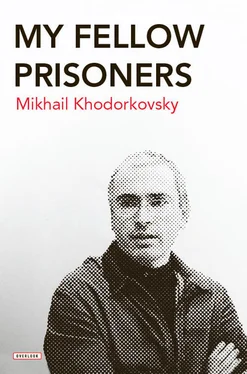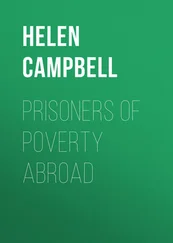But there is another way out, and Yury Ivanovich took it. He handed in his resignation. Is this really the solution though? Because this raises another important issue: the process of ‘negative selection’, whereby gradually only the worst people remain in the system. Those who don’t have the intelligence to understand what’s going on, and those who do understand but don’t have enough of a conscience to refuse to become part of it.
So idiots and lowlife – great material for building up the machinery of state.
And yet this is indeed our state.
Arkady Bondar is a tall young guy with a broad smile that lights up his handsome face. He’ll go up to every newcomer, when they’re sitting dejectedly on their bed in the new arrivals’ barracks, and strike up a conversation about life, or the reason they’ve ended up at the camp… Only a very naïve person will keep up the conversation. But the new arrival feels a need to talk, and there are plenty of naïve people around.
Other detainees in the barracks will watch what’s going on with disapproval, but they don’t get involved.
For Arkady is an ‘official’ grass; he works as an orderly in the Operations Division. Which means that he’s nominally responsible for ensuring that the building is kept clean and tidy. But, in fact, he does something else entirely. He’s a ‘tongue-loosener’ who tries to extract information about any crimes or accomplices the new arrival might have kept quiet about during his investigation.
But even this isn’t his main task. His core ‘business’ is finding out who has banned stuff in their possession. Anything hidden during the search – money, playing cards, a sweater – lands the unsuspecting owner fifteen days in the isolation cell, and earns Arkady a carton of cigarettes or permission to use an otherwise banned iPod.
It’s not a good idea to cross him. You might just find that, when it comes to the next routine search, those same playing cards mysteriously turn up in your bag.
So everyone keeps their mouths shut, exchanging meaningful looks instead. An experienced detainee will understand, while the rookie – well, what can you do, such is his fate. A bit later, when everyone’s got to know each other and worked out who’s who, we discuss Arkady and point out a further three grasses, operating further undercover than him…
But for now Bondar disengages himself from his victim, having had his fill. Result! He’s found something out, the leech. And now he’ll run off to grass on the guy. Sure enough, there he goes…
Incidentally, for a small fee Arkady will fetch you something from the visiting room, or even buy back from the officers something that’s been confiscated.
He usually gives me a wide berth. But now I see him whispering something to my neighbour, who then comes up to me.
‘Borisich, how do you spell “discrediting”?’
‘Why do you want to know?’
‘Bondar’s asking.’
‘Bondar, come here, will you?’
He comes over, avoiding eye contact. He’s clearly scared. His parole is coming up and getting into an argument with me is the last thing he needs.
‘Why do you want to know this?’
‘The officers asked me.’
‘Asked you what?’
‘To write that you are discrediting the administration. But I don’t know the word.’
‘Get out of my sight.’
That evening I go and see the officers.
‘You should at least think about whom you’re giving these errands to.’
‘Come on, Mikhail Borisovich, you know the kind of people we have in here,’ they reply, not embarrassed in the least. ‘We have to work with what we’ve got.’
We part with a few facetious remarks. I’ve won this round. But they’re not in any hurry.
To most Russians, grassing people up is a deeply immoral business. Unlike the Germans or Americans, who regard ‘informing the authorities’ as something sacred. In our country informers have devastated millions of innocent lives. Almost every family has its victim of the repressions. The hatred of informers is engrained, sometimes even subconscious. Like coals covered with a dusting of ash, just blow on them and they’ll flare up again…
In the camps, though, such behaviour is made the norm. In some cases it works, in others less so. These kinds of people are useful for the administration. But how on earth are they going to live when they’re released? With values that society finds unacceptable.
We all know that sometimes you have to report what you’ve seen for everyone’s safety, and sometimes in order to ensure justice.
But to inform on someone for a handout – that’s worse than stealing. In Russia the informer’s true reward is the utter contempt of those around him.
And you know something? I’m very glad my country is still like that.
As for Bondar, I heard of him again about two years later, in Chita. In that time he’d been released and already got himself put away again. He was transported 650 kilometres from his camp to take part in my trial and give evidence against me. Remarkably he never did appear in the courtroom.
They brought him in and shoved him into the cell. He was a terrible sight, with a face the colour of mud, hands still black even after decontamination, and a thicket of hair that seemed to stick out uniformly all over his face and head. You couldn’t get a good look at his eyes as they were swollen, either from a beating or a beating combined with a hangover. He looked, at first glance, about sixty to sixty-five years old. He shuffled in, peering around, and wound his way to the bed which one of us pointed out to him.
The old man unrolled the mattress, collapsed on to it and stayed there in silence for almost two days, getting up only for inspections and to go to the toilet. Nobody bothered him. On the third day he finally got up for the gruel as well. At which point we tried to engage him in conversation, but his unintelligible answers revealed nothing except what he’d been put inside for – hooliganism. The usual story.
Ignoring, as always, the Federal Penal Enforcement Service’s misanthropic ban on sharing things, we gave him some tracksuit trousers, a jacket, underwear and a razor, supplemented his gruel with a few extras from our food parcels, and then forgot about the old man. After all, everyone has his own business to get on with, and it’s a big cell.
Another week went by. One day I got back from a meeting with my lawyers and saw a newcomer – someone about my own age who’d clearly not had an easy life but looked pretty robust – busily tinkering with our television, having taken the back off it. I got a sinking feeling in my stomach. The television in our cell barely had a functioning picture but you could at least hear the news – and for me the news is my life.
‘Who’s this?’ I groaned.
‘Meet Valentin Ivanovich,’ my cellmates responded. ‘Remember the old guy? It’s him. He’s a radio technician. He says he can fix it.’
Valentin Ivanovich didn’t turn round but nodded and continued with the job, kitted out as he was with a sharpened spoon and paperclips.
A few days later we got talking. His was a familiar story: his son was killed, then his wife died, he started drinking heavily, his devious neighbours got him kicked out of his apartment, he lived on the streets for nearly a year, got into a fight – and was brought in. Later I had a chance to look at his case file – the same story, just written in officialese.
He was pleasant to talk to, although we had very little time together because the court cases and the vast quantity of documents I had to read left only a tiny window of opportunity. He too was always busy, fixing things, equipping the cell in one way or another. The cell had clearly become his new home. And when, during my hunger-strike, the administration tried to get him to sign a false document saying that the hunger-strike hadn’t taken place, like the rest of my cellmates he refused to do so, despite coming under significant pressure.
Читать дальше












